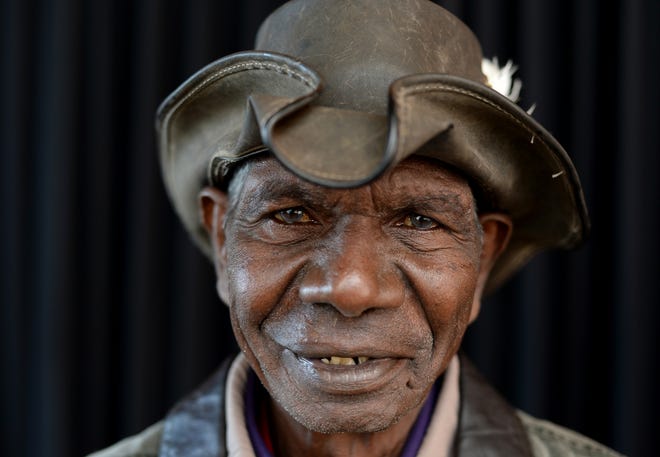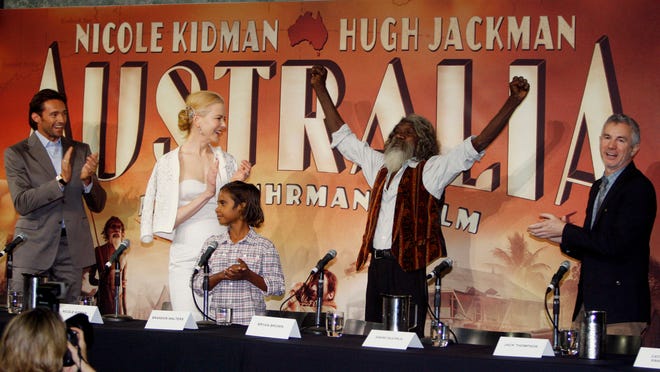Canberra, Australia — Australia’s most acclaimed Indigenous actor and dancer, David Gulpilil, has died of lung most cancers, a authorities chief mentioned on Monday. He was 68 years previous.
Gulpilil discovered his widest audiences along with his roles within the 1986 hit movie “Crocodile Dundee” and in director Baz Luhrmann’s 2008 epic “Australia” in a profession that spanned 5 a long time. He was usually described as a bridge between Indigenous Australia and the surface world who by no means match comfortably in both place.

“It’s with deep disappointment that I share with the folks of South Australia the passing of an iconic, once-in-a-generation artist who formed the historical past of Australian movie and Aboriginal illustration on display,” South Australia state Premier Steven Marshall mentioned in a press release.
An achieved didgeridoo participant, Gulpilil combined with Jimi Hendrix and Bob Marley. He was feted in New York and Paris. He additionally spent intervals of his life as an itinerant ingesting and sleeping in parks within the northern Australian metropolis of Darwin and stints in jail for alcohol-fueled offenses.
Gulpilil was born on tribal land within the sparsely populated wilds of the Australian northern frontier within the early Nineteen Fifties, his pal and caregiver Mary Hood mentioned. His date of delivery was recorded as July 1, 1953, a guesswork date set by native missionaries.
First contacts between Indigenous Australians and the surface world had been changing into uncommon however continued within the distant Outback for one more 30 years from the time of Gulpilil’s delivery. Household teams adopted in nomadic traditions unaware their land had been colonized by Britain two centuries earlier.
Gulpilil mentioned he by no means noticed a European Australian till he was 8 years previous and thought of English his sixth language, his biographer Derek Rielly wrote. The opposite 13 had been Indigenous dialects. Gulpilil’s Christian identify was foisted upon him at college.
Gulpilil was a 16-year-old ceremonial dancer performing within the Indigenous mission of Maningrida in 1969 when he met British director Nicolas Roeg, who was scouting for filming places. Gulpilil starred in Roeg’s acclaimed 1971 film “Walkabout” as a lone youth wandering the Outback as a part of a tribal ceremony of passage, who comes throughout and rescues two misplaced British youngsters. The British siblings had been performed by a teenage Jenny Agutter, who later discovered fame in Hollywood, and the director’s 7-year-old son, Lucien.
Roles adopted in well-liked films “Storm Boy” in 1976 and “The Final Wave” in 1977.
His closing function was the remake of “Storm Boy” in 2019, by which he performed the daddy of the central character within the authentic, Fingerbone Invoice.
Gulpilil recalled studying to binge on alcohol and medicines from counter-culture icon Dennis Hopper, who performed the starring function within the 1976 film a few nineteenth-century Australian outlaw, “Mad Canine Morgan.” The 22-year-old Indigenous actor had third billing on the movie after Hopper and Jack Thompson, a stalwart in Australian cinema.
Gulpilil gained a number of best-actor awards for the 2002 Rolf de Herr-directed film “The Tracker,” by which he performed one of many many Indigenous males that Australian police routinely used as trackers of fugitives within the Outback.
Weeks earlier than the film was launched, journalists visited him within the small Indigenous group of Ramingining on his crocodile-infested tropical tribal land. He was dwelling in a hut along with his then-partner, Indigenous painter Robyn Djunginy, with out energy or operating water.
They cooked kangaroo meat and fish over an open fireplace beneath a scrap iron roof. Looking spears had been slung from a rafter and Gulpilil stored a wood Indigenous combating membership often called a nulla nulla for self-protection.
“I used to be introduced up in a tin shed. I wandered everywhere in the world — Paris, New York — now I’m again in a tin shed,” Gulpilil mentioned.
He introduced himself as a sufferer of his personal superstar and his personal folks’s misunderstanding of his place within the wider world.
“Individuals say to me: You’re a giant identify. You’ve gotten cash. Why don’t you purchase your self a home; get out of Ramingining?” he mentioned.
“That is my nation. I belong right here, and I’m broke,” he added.
Precisely why he was broke was not clear. He was imprecise about how a lot he earned through the years, and wealth in Australian Indigenous society is communal, tending to permeate via relations and associates.
Again then, Gulpilil appreciated to drink beer, smoke marijuana and take kava. However as a result of all three had been banned in Ramingining, he prevented a few of the temptations of metropolis life excesses.
Gulpilil’s pal and caregiver, Hood, first met him in 2006 on the Darwin premiere of “Ten Canoes,” the primary feature-length film in an Australian Indigenous language.

Gulpilil narrated the film and his son, Jamie Gulpilil, was a part of the solid that was principally drawn from Ramingining.
“Once I first met him, I noticed an actual kindness,” Hood mentioned. She acknowledged there was additionally a “darkish” aspect.
A Darwin choose sentenced Gulpilil in 2011 to a yr in jail for breaking the arm of his then-partner, indigenous artist Miriam Ashley, throughout a drunken argument in a Darwin dwelling. He used his time in jail to show his life away from alcohol and hashish.
Hood often visited Gulpilil in jail. He was launched to dwell together with her and, for a time, Ashley at Hood’s Darwin dwelling whereas on parole. He finally adopted Hood to Murray Bridge in South Australia state, 3,500 kilometers (2,200 miles) from Ramingining and his conventional nation.
Hood grew to become his caregiver after he was recognized with inoperable lung most cancers in 2017.
He’s survived by his sisters Mary and Evonne, daughters Makia and Phoebe, and sons Jamie and Jida. Director Peter Weir mentioned throughout an interview in New York in 1977 whereas selling his supernatural thriller “The Final Wave” that Gulpilil had created untold private tensions by straddling two disparate cultures.
“He’s enigmatic. He’s an actor, a dancer, a musician. He’s a tribal man, initiated within the tribal methods,” Weir mentioned. “He has a foot in each cultures. It’s an unlimited pressure on the person.”















